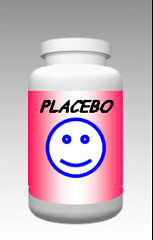 If you read the literture of medical research you will find that the very best studies of the effects of drugs and nutritional supplements will always involve comparing the item being tested against the same standard: a "Placebo". Whether the study is to see if the newest, multi-million dollar anti-cancer drug is effective against cancer of the pancreas, or to see if ginger capsules are helpful with motion sickness the treatment given to the control group will be a placebo. If that anti-cancer drug can be shown to be vastly better than the placebo the drug company will be jubilant -- because, in many cases that "placebo" is pretty dang good.
If you read the literture of medical research you will find that the very best studies of the effects of drugs and nutritional supplements will always involve comparing the item being tested against the same standard: a "Placebo". Whether the study is to see if the newest, multi-million dollar anti-cancer drug is effective against cancer of the pancreas, or to see if ginger capsules are helpful with motion sickness the treatment given to the control group will be a placebo. If that anti-cancer drug can be shown to be vastly better than the placebo the drug company will be jubilant -- because, in many cases that "placebo" is pretty dang good.In a nutshell, the Placebo Effect is the tendency of patients and test subjects to have real positive effects when given treatements that they believe might be helpful, even if the treatment given has no direct physical action at all. Study after study after study has shown that pain, for instance, can be aleviated to a large degree by the administration of a placebo. One third of study subjects with moderate pain can be expected to report significantly better pain relief from a placebo when compared to a control group that receives no treatment at all. There is some debate about whether the placebo effect is entirely subjective, or whether it can be demonstrated to show measurable, objective physical improvements. There is decent science on both sides of that debate and I do not particularly have an opinion one way or the other.
What I do know is that the placebo effect can easily be your friend. If you have some sort of a condition which is either not bad enough to justify the possible side effects of a more-effective treatment, or a condition for which no "approved" effective treatment exists, then that 30 percent chance that a placebo will be helpful starts to sound pretty good. All you need to do is find something that is cheap, harmless, and has some anecdotal evidence that it might be helpful for what ails you and there you go. Vitamin C during sniffle and drip season? Peruvian Maca for low (libido*COUGH*) energy? Vick's Vapo-Rub for toenail fungus? Why the hell not?
Of course you have to be careful what you read. Take the case of Saw Palmetto for enlarged prostates. There were years and years of decent, well-designed if rather small studies that suggested that Saw Palmetto extract was helpful with the symptoms of Benign Prostate Hypertrophy. Millions of men about my age took the stuff and many found it helpful. Then along came a group of party poopers who did really big study and found that Saw Palmetto is was no better than placebo. *sigh* In their study something like 30 percent of the participants found Saw Palmetto helpful and another 30 percent liked the placebo. That makes them all 30 percent better off than we all are now. The middle-aged men of the world are now 30 percent less likely to sleep through the night without getting up to pee because a group of meddlesome urologists had nothing better to do than to let the air out of our favorite placebo.
I am not suggesting that we should put a stop to science. (I'm not sure I am suggesting anything and tend to doubt that I am.) But I do tend to question the dog-in-a-manger glee with which some members of the mainstream medical community greet purely negative news about "alternative" therapies. I swill down pills by the handfull every day, trying to delay the enevitabilities of life, and I rather resent the assumption that I do so because I have been hornswoggled by the yayhoos in the nutritional supplements industry. I am fully aware, statistically speaking, that half of what I take consists of harmless-but-useless placebos that will eventually be replaced by something else that new research suggests is better. My "snake oil" isn't free but I try to stay informed and to balance the trade off between science and cost. There are a number of things I might be taking if the science behind them were stronger -- or if they were cheaper. There are other things (Maca*COUGH*) for which the science is, shall we say, dodgy but the product is safe and cheap and the placebo value is large. If someone does a study that shows that something I take is bad for me I am interested. If something else is shown to be better, again I am interested. But if something is shown to be no better than placebo I might just be happier not knowing about it.

No comments:
Post a Comment